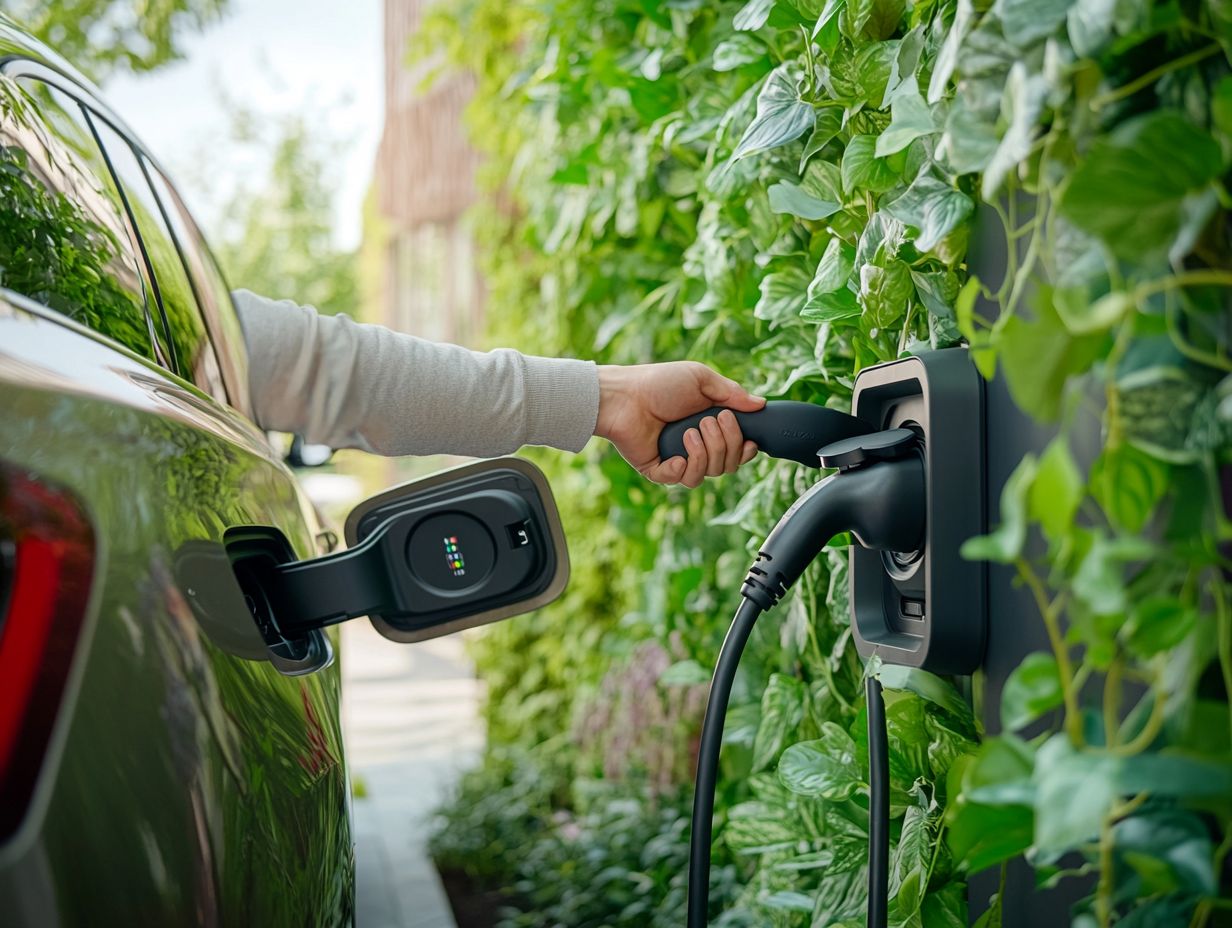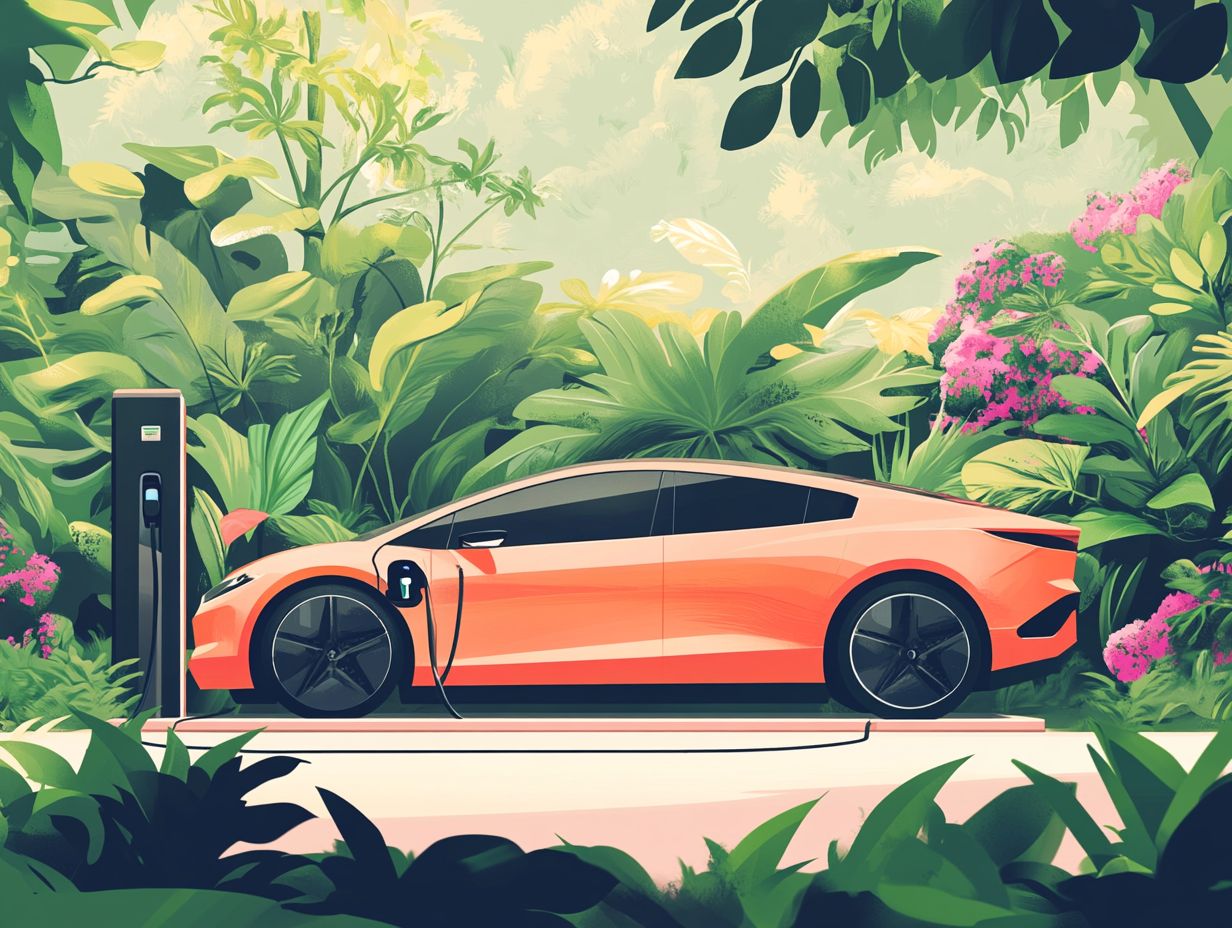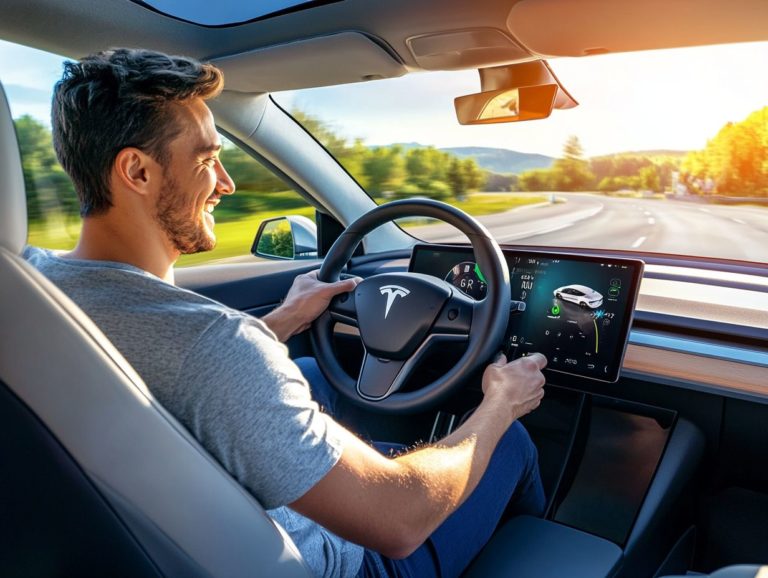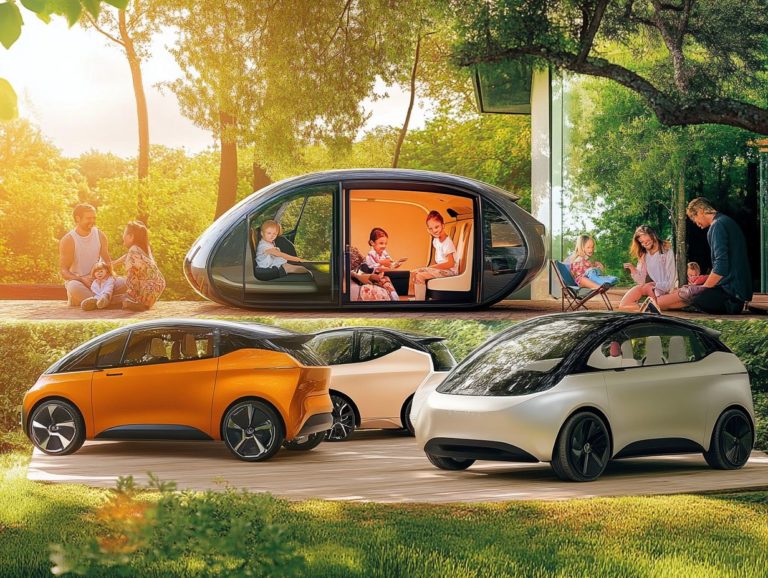5 reasons to consider a hybrid electric vehicle
As the world embraces more sustainable transportation options, hybrid electric vehicles (HEVs) emerge as an enticing choice for eco-conscious drivers like you.
These vehicles greatly lower your carbon emissions and provide financial savings on fuel and maintenance. This article delves into five key reasons to consider making the switch, along with a deeper exploration of how HEVs operate, their various types, and essential factors to think about before purchasing.
It also highlights the benefits and potential drawbacks of hybrid vehicles, ensuring you have all the information necessary to make a well-informed decision.
Contents
- Why You Should Consider A Hybrid Electric Vehicle NOW!
- 1. Reduces Carbon Footprint
- 2. Saves Money on Fuel Costs
- 3. Lower Maintenance Costs
- 4. Eligible for Government Incentives
- 5. Provides a Smooth and Quiet Ride
- What is a Hybrid Electric Vehicle?
- Frequently Asked Questions
- What is a hybrid electric vehicle?
- What are the benefits of owning a hybrid electric vehicle?
- How does a hybrid electric vehicle achieve better fuel efficiency?
- Are there any tax incentives for purchasing a hybrid electric vehicle?
- Do hybrid electric vehicles require special maintenance?
- How does owning a hybrid electric vehicle benefit the environment?
Why You Should Consider A Hybrid Electric Vehicle NOW!

Reduce your carbon footprint by switching to a hybrid electric vehicle, which emits less pollution than traditional cars.
Save money on fuel costs with a hybrid electric vehicle, as it uses both gas and electricity to power the car.
Experience lower maintenance costs with a hybrid electric vehicle, thanks to fewer moving parts and less frequent oil changes.
1. Reduces Carbon Footprint
Electric cars are essential in your journey to lower your carbon footprint, greatly reducing greenhouse gas emissions compared to traditional gasoline vehicles. By embracing electric vehicles, you’re not just opting for a mode of transport; you’re contributing to cleaner air and a healthier environment for everyone.
With zero tailpipe emissions, these vehicles tackle urban air pollution directly. Switching from a gasoline car to an electric vehicle can cut your annual carbon emissions by approximately 4,500 pounds. This change helps combat climate change and improves local air quality, leading to fewer respiratory issues in the community.
Cities that adopt EVs often see a marked reduction in smog and particulate matter, paving the way for a more sustainable future for all.
Your choice to support the widespread adoption of electric vehicles can lead to a dramatic decrease in harmful emissions, playing a vital role in the global fight against environmental degradation.
2. Saves Money on Fuel Costs
One of the most compelling advantages of electric vehicles is their potential for significant savings on fuel costs. With superior fuel efficiency and often lower charging expenses compared to traditional gasoline vehicles, the financial benefits are hard to ignore.
Reducing your reliance on gasoline cushions you against fluctuating fuel prices, which can be especially burdensome during market ups and downs. While gas prices can swing dramatically, as an electric vehicle owner, you typically pay just a few dollars per gallon when charging at home.
Utility rates also affect your charging costs. Many regions offer lower rates during off-peak hours or special incentives for electric vehicle owners. This allows you to strategically plan your charging sessions for even greater savings over time.
3. Lower Maintenance Costs
Electric vehicles generally come with lower maintenance costs compared to traditional cars due to their simpler mechanics and fewer moving parts. This streamlined design translates to reduced maintenance expenses.
You ll no longer deal with frequent oil changes that gas-powered vehicles demand, which can add up. With a system that helps slow the car down, saving energy and extending brake life, you also reduce wear on brake components, leading to longer-lasting brakes. This means you won’t have to fret over regular brake replacements as often.
All of these factors come together to create significant long-term financial savings, making electric vehicles a smart choice for those mindful of their budgets and eager to minimize routine maintenance costs.
4. Eligible for Government Incentives

In many regions, you ll find that electric vehicles qualify for a range of enticing government incentives, including federal tax credits and state-specific programs like California’s Clean Vehicle Rebate Project. These incentives make buying an EV financially appealing.
Often, these incentives come as substantial tax credits, which can slice thousands off the overall price, along with direct rebates that grant you instant cash back right at the point of purchase.
Some states enhance the deal with benefits like reduced vehicle registration fees, access to high-occupancy vehicle lanes, and even charging station installations, making electric vehicle ownership even more attractive.
Altogether, these initiatives aim not only to encourage eco-friendly options but also to lessen the initial financial strain. This helps pave the way for long-term savings on fuel and maintenance.
Making the switch to electric is not just a smart choice for the environment, but for your wallet as well.
5. Provides a Smooth and Quiet Ride
Electric vehicles offer you a remarkably smooth and quiet ride, thanks to their electric motors that deliver instantaneous torque. This leads to an overall driving experience that emphasizes both comfort and efficiency.
Unlike traditional gasoline cars, where engine noise and vibrations can create a jarring atmosphere, electric vehicles glide effortlessly along the road. This serene environment allows you and your passengers to engage in meaningful conversations or enjoy your favorite tunes without the usual distractions.
The absence of an internal combustion engine enhances your comfort and significantly reduces air pollution and noise levels in urban settings. This makes electric vehicles an exceptional choice for anyone who values eco-conscious transportation.
By choosing these innovative models, the advantages go beyond mere driving pleasure; they signify a meaningful step toward a more sustainable future.
What is a Hybrid Electric Vehicle?
A hybrid electric vehicle (HEV) merges an electric motor with a conventional gasoline engine, presenting you with an exceptional combination of fuel efficiency and a reduced environmental footprint qualities that resonate with eco-conscious drivers like yourself.
This innovative design gives you the power to utilize the electric motor for low-speed driving, effortlessly transitioning to the gasoline engine when you need more power or speed. By harnessing these dual energy sources, you can enjoy a notable decrease in harmful emissions, playing your part in promoting cleaner air and reducing reliance on fossil fuels.
Now is the time to embrace sustainable options, as HEVs stand out in the evolving landscape of fuel-efficient vehicles, embodying a commitment to advancing automotive technology while championing environmental objectives. Their blend of versatility and efficiency makes them a compelling choice in today s eco-friendly market.
How Does a Hybrid Electric Vehicle Work?
Hybrid electric vehicles operate by utilizing the strength of both an electric motor and a gasoline engine, seamlessly transitioning between these two sources to optimize fuel efficiency and reduce emissions.
This cutting-edge system is all about strategic integration. The electric motor takes the lead during low-speed driving or acceleration, which diminishes your reliance on the gasoline engine.
When you find yourself in high-demand situations, the gasoline engine steps in, delivering optimal performance without compromising on efficiency. Regenerative braking captures energy when you brake and uses it to recharge the battery.
This harmonious duality not only elevates your driving experience but also plays a significant role in promoting a more sustainable environment by decreasing fuel consumption and minimizing greenhouse gas emissions.
What Are the Different Types of Hybrid Electric Vehicles?

You have several options when it comes to hybrid electric vehicles, including conventional hybrids, plug-in hybrids, and mild hybrids. Each type varies in fuel efficiency and electric-only driving capabilities, catering to different needs.
Conventional hybrids combine an internal combustion engine the traditional engine that uses gasoline with an electric motor. They work in harmony to optimize fuel consumption, which is especially beneficial for city driving with its stop-and-go traffic.
Plug-in hybrids, however, take it a step further. They come equipped with larger batteries that you can charge from an external power source. This allows you to travel considerable distances purely on electric power before needing to switch back to gasoline.
Then there are mild hybrids, which offer a more subtle approach. They use electric assistance primarily to boost engine performance and improve fuel economy but don t allow for full electric driving.
Each type caters to distinct driving preferences. If you’re a commuter, you might lean towards plug-in hybrids for your short trips. Conversely, traditional hybrids could be ideal for those frequently covering longer distances.
Grasping these differences gives you the power to choose the hybrid vehicle that aligns perfectly with your lifestyle and driving habits.
What Are the Factors to Consider When Purchasing a Hybrid Electric Vehicle?
When you’re considering the purchase of a hybrid electric vehicle, it’s essential to take several key factors into account. Think about your driving habits, battery capacity, and potential resale value. Additionally, you might want to explore the 67. 5 reasons to choose an electric family car to ensure your investment aligns with your lifestyle.
Consider your typical driving patterns. Do you often take short commutes, or are longer trips more your style? This distinction can significantly impact fuel efficiency and overall savings.
Battery life also plays a crucial role. Understanding how the battery works and its longevity can influence your maintenance costs in the future. Don’t overlook the total cost of ownership, including insurance and upkeep, as this will provide a clearer picture of your financial commitment.
By thoughtfully evaluating these elements, you can enhance your ownership experience and fully reap the rewards that come with choosing a hybrid vehicle.
How Can a Hybrid Electric Vehicle Benefit the Environment?
Hybrid electric vehicles provide substantial environmental advantages by cutting down on transportation emissions. They help to lower overall greenhouse gas emissions when compared to traditional gasoline engines.
These vehicles seamlessly blend an internal combustion engine with an electric propulsion system. This enables them to operate more efficiently, especially in urban settings where stop-and-go traffic is the norm.
This enhanced efficiency leads to reduced fuel consumption. As a result, hybrids produce lower carbon dioxide emissions. Unlike their conventional counterparts, which release considerable amounts of pollutants and greenhouse gases, hybrids excel at significantly minimizing their carbon footprint.
This reduction is vital in the ongoing battle against climate change. Transportation is one of the largest contributors to global warming. By opting for hybrids, you not only mitigate your own environmental impact but also champion a wider transition toward sustainable transportation solutions.
What Are the Disadvantages of a Hybrid Electric Vehicle?
While hybrid electric vehicles undoubtedly present a myriad of advantages, they also come with drawbacks, including higher initial costs and potential maintenance expenses.
These factors can significantly impact your decision-making process. The financial implications of purchasing a hybrid often extend beyond the initial sticker price. You must also consider the costs associated with replacing those expensive batteries after their lifespan, which typically averages between 8 to 15 years.
The complexities of their advanced technology may lead to higher repair costs should issues arise. If you reside in an area with limited service options, the need for specialized maintenance can pose further challenges.
This combination of financial and technical hurdles could deter many potential buyers from choosing a hybrid solution, even when weighed against its environmental benefits.
Frequently Asked Questions

What is a hybrid electric vehicle?
A hybrid electric vehicle (HEV) combines a gasoline engine with an electric motor and battery. This lets the vehicle use either gasoline or electricity for power.
This improves fuel efficiency and reduces emissions.
What are the benefits of owning a hybrid electric vehicle?
Owning a hybrid electric vehicle offers many advantages. You ll enjoy better fuel economy, lower emissions, possible tax breaks, and quieter rides.
How does a hybrid electric vehicle achieve better fuel efficiency?
A hybrid vehicle achieves better fuel efficiency by using a system that recovers energy when you brake. The vehicle can also run on electricity at low speeds or in stop-and-go traffic.
Are there any tax incentives for purchasing a hybrid electric vehicle?
Yes! Both the federal and state governments often provide tax incentives for purchasing a hybrid electric vehicle. These can range from a few hundred to several thousand dollars.
Do hybrid electric vehicles require special maintenance?
Hybrid electric vehicles need regular maintenance just like any other car. However, they usually have lower maintenance costs since the electric motor and battery need less upkeep.
How does owning a hybrid electric vehicle benefit the environment?
Hybrid electric vehicles produce significantly lower emissions than traditional gasoline-powered cars. They consume less gasoline, which helps reduce our reliance on fossil fuels and combat climate change.






